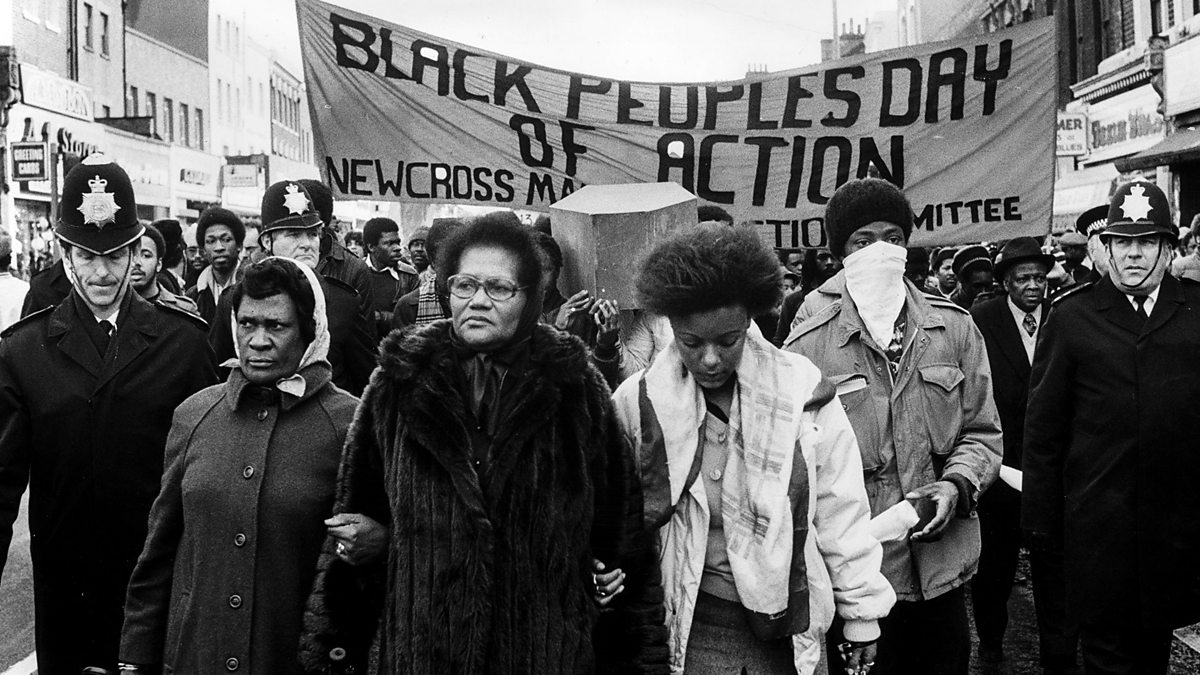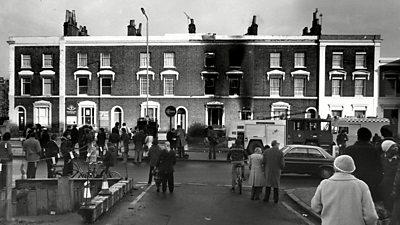Earlier this year, Steve McQueen addressed the forgotten history of black British people through the Small Axe dramas he made for the BBC. Now McQueen has turned to documentary for Uprising. It airs over three successive nights and was co-directed with documentarist James Rogan; this viewer found it far more gripping than the dramas.
In the small hours of Sunday 18th January 1981, a fire ripped through a house in New Cross, south London. Thirteen young people died, many more were left with life-changing injuries. They had been enjoying a birthday party for two teenage girls; Yvonne Ruddock was turning 16 and died in the inferno at her family home, along with her brother Paul, the oldest victim at 22. His pregnant wife Sandra had left the party earlier. Forty years later she is one of Uprising’s many impressive interviewees who bear witness to the that night and the years of dispute that have followed.
There had been arson attacks on a youth club and a music venue frequented by young black locals; the racist National Front with their aggressive marches regularly targeted south London’s black neighbourhoods. The fire at the three storey house on New Cross Road turned into a nightmarish conflagration of heat, smoke and flames so rapidly that the police, the survivors and the victims’ families suspected an accelerant had been involved. Unfortunately, no evidence of a fire-bomb being thrown into the front room has been found to date, despite two inquests. It’s been impossible to ascertain definitively whether the New Cross fire was a murderous act of arson by an outsider or an accidental blaze that started inside the house. An unsatisfactory open verdict remains to this day, with no closure for many grieving family members and traumatised survivors.
What isn’t disputed is that the investigation of the fire in 1981 was handled in such a way by the police and covered so badly by the press that it triggered accusations of racism. Partygoers as young as 11 were grilled at the police station about whether there had been an argument at the party between rival boys; some of them were interrogated for hours without adults to advocate for them and later retracted their statements. Tension ran extremely high and a protest march billed as a Black People's Day of Action was planned for March, with a route agreed with the police from Lewisham into central London. It turned into a bloody battle on Blackfriars Bridge when the Met deployed riot shields to block the estimated 10-20,000 marchers crossing the river. The recently imposed sus law, that led to officers stopping and searching anyone on the street on the flimsiest of grounds, further inflamed the local community.
 McQueen chronicles how the summer of 1981 saw cities all over England explode into rioting and civil insurrection. Frustrated and furious protesters, both black and white, united to attack what they saw as police brutality and Establishment indifference. The resulting Scarman inquiry into the Brixton riot concluded that police practices had to change, but as its secretary, Phillip Mawer, observes here: "saying it needs to be done is not the same as it being done".
McQueen chronicles how the summer of 1981 saw cities all over England explode into rioting and civil insurrection. Frustrated and furious protesters, both black and white, united to attack what they saw as police brutality and Establishment indifference. The resulting Scarman inquiry into the Brixton riot concluded that police practices had to change, but as its secretary, Phillip Mawer, observes here: "saying it needs to be done is not the same as it being done".
Rogan and McQueen have assembled an impressive cast for their documentary series; there is shockingly vivid testimony from survivors including a young DJ, Wayne Haynes, who jumped from a first floor window with his skin on fire and sustained multiple fractures when he crashed through an outhouse roof below. Cultural context is provided by writers Alex Wheatle and Linton Kwesi Johnson, and key activists, including Leila Hassan Howe, give extensive accounts of the politicisation of the protests.
Former Scotland Yard undercover detective Peter Bleksley, a newly qualified police constable at the time and George Rhoden, one of the few black officers then in the Met, describe a force riddled with racism, with many officers sympathising with the National Front. Jackie Malton (the inspiration for DCI Tenison in Prime Suspect) was involved in the initial investigation as a detective sergeant. Interviewed here, she initially leaves herself open to attack for criticising the parents who let the teenagers party all night, but redeems herself by acknowledging that the force did not do a good job at the time.
Uprising is a truly gripping watch. The well-shot and sensitively edited interviews are enhanced by excellent use of archive, not only from the news of the time but period footage which brings the locale and era to life. Music is deployed for emotive impact, whether it's evoking warm memories as Night Nurse, Gregory Isaacs's Lover’s Rock hit plays over a sound system while young party goers dance, or Bob Marley’s anthem, Get Up Stand Up, energising the protesters on the street. Given a generous three hours, McQueen has time to tell not just the story of that one terrible night, but also the evolution of black British culture and political protest. He traces a path from what happened in 1981 to where we are today, and doubtless there will be many made uncomfortable by his argument.















Add comment